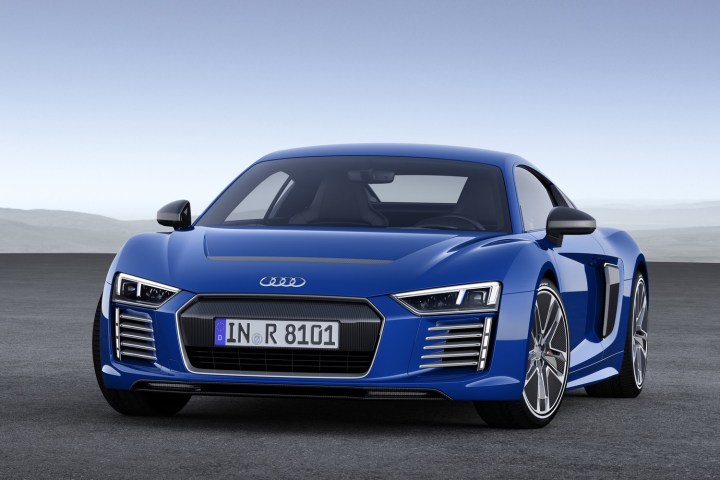
Audi spent years waffling over whether to put the R8 e-tron, an electric version of the German firm’s R8 supercar, into production. It finally did, unveiling the production model at the 2015 Geneva Motor Show. But less than two years later, Audi is pulling the plug on the R8 e-tron.
In the time since it went on sale, Audi has built less than 100 copies of the R8 e-tron, according to Car and Driver. Audi said it could have built more, but the automaker didn’t exactly go out of its way to promote its production electric car. Audi reportedly never published sales literature for the Europe-only vehicle, and didn’t include the e-tron in its online configurator. Moreover, cars were built to order, so it’s not like customers were going to see one just sitting on a dealer lot. Then there was the price: a reported $1.1 million.
The decision to kill off the R8 e-tron comes after one of the longest and most convoluted development programs in recent automotive history. The R8 e-tron was first shown as a concept car at the 2009 Frankfurt Motor Show, and the car was an on-again, off-again affair for the next few years.
Executives’ conflicting feelings about the car delayed development for so long that the process actually spanned two generations of R8. The original concept was based on the first-generation model, while the production version was based on the current, second-generation model.
Read more: Audi is all charged up about Formula E electric-car racing
In the interim, Audi ditched the concept’s four-motor layout for a setup that used two electric motors on the rear axle, making the e-tron the only R8 variant with rear-wheel drive instead of all-wheel drive. The production car produced 456 horsepower and 679 pound-feet of torque. Audi quoted a 0 to 60 mph time of 3.9 seconds, with an electronically limited top speed of 130 or 155 mph.
That was in spite of a hefty 4,056-pound curb weight, compared 3,428 lbs for a base R8 V10. The extra weight was largely due to the 92 kilowatt-hour lithium-ion battery pack, which Audi said provided a range of 280 miles. That was a major improvement over the 134 miles of the first e-tron prototype, and a decent figure by current standards.
Audi’s next electric car won’t be as sexy as the R8 e-tron, but it will be more ambitious. It’s an electric SUV based on the e-tron quattro concept from the 2015 Frankfurt Motor Show. Audi has promised a range of around 300 miles, and plans to begin production in 2018. Unlike the R8 e-tron, the SUV is intended to be a fairly high-volume model.


